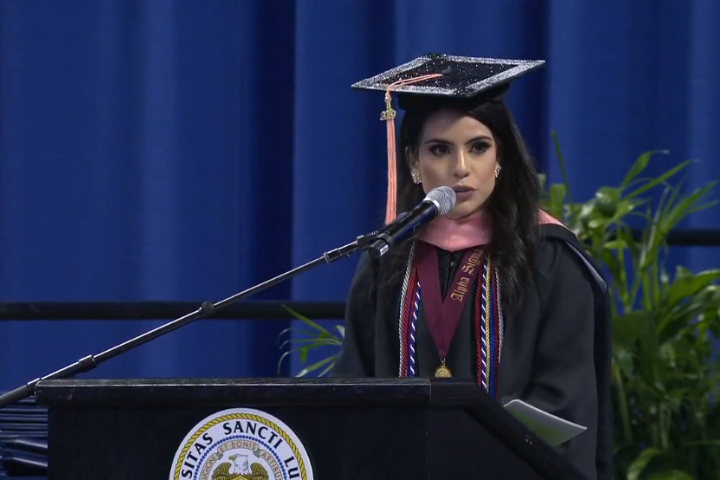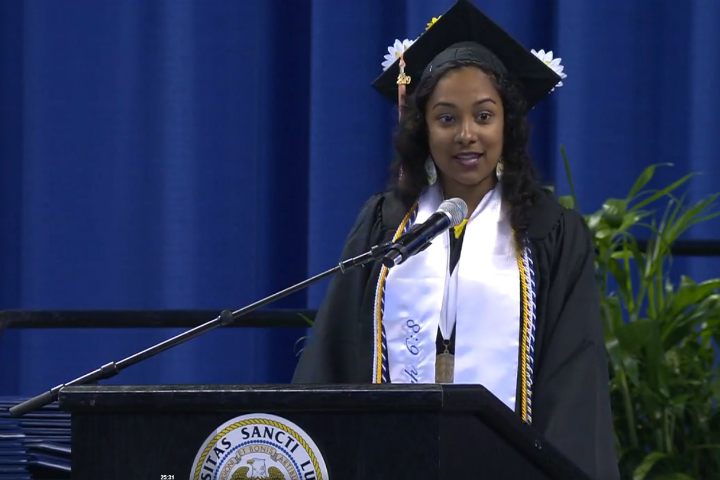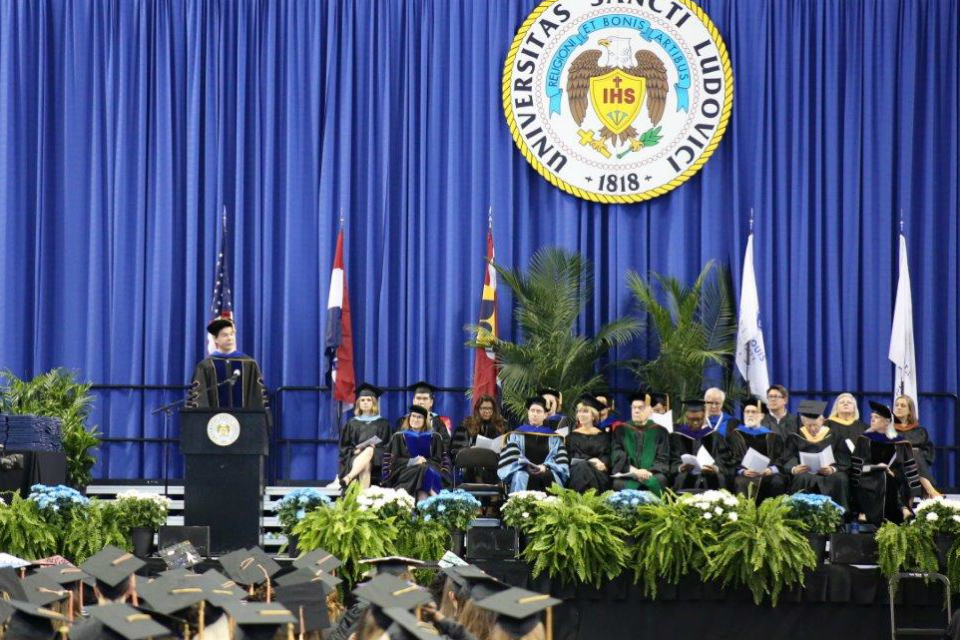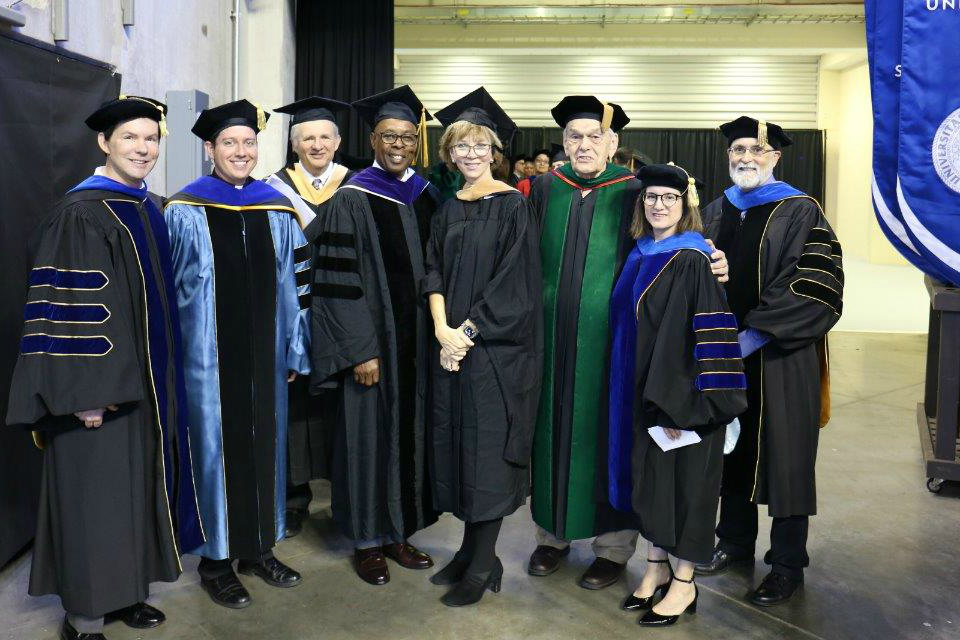Congratulations, Class of 2019!
The College for Public Health and Social Justice at Saint Louis University celebrated its annual precommencement ceremony May 16, 2019 at Chaifetz Arena.
Dean Tom Burroughs, Ph.D., stated in his welcome address, “In a unique way, we are able to come together as faculty, staff and students to address some of the most important challenges we face today as a society.”
The College for Public Health and Social Justice and SLU's Center for Health Outcomes Research, of which Burroughs is also dean, are the only college and center in the U.S. that bring together diverse, yet complimentary fields of public health, social work, health management and policy, urban planning, applied behavioral analysis, criminology and criminal justice, outcomes research, and data science.
Our 424 graduates reflect the following:
- 154 undergraduates and 270 graduate students
- 10 countries and 216 cities across 35 states
- 35 different faith traditions
- Ages ranging from 19 to 60s
- 3 graduates who served in the armed services
- 63 different degree and certificate concentration combinations
Distinguished Guests
The College for Public Health and Social Justice hosted the following distinguished guests, who were present at the ceremony:
- Dr. Jim Kimmey, founding dean of the School of Public Health
- Herb Bernsen, M.S.W. alumnus, and former director of the Department of Justice Services in St. Louis County
- Judge Jimmie Edwards, director of the City of St. Louis Department of Public Safety
- Laura Kaiser, M.H.A./MBA alumna, and president and CEO of SSM Health. Laura Kaiser also provided a welcome to new alumni.
Awards
2019 Terry Leet Award Recipient — Dr. Travis Loux
The Terry Leet Award honors a dear colleague, leader and friend of all in the School of Public Health. Dr. Leet had a gift for teaching and for distilling complicated information into simple concepts. He was fully committed to the growth and development of students.
Dr. Leet died in 2009, leaving a legacy of teaching excellence, which the college honors every year at graduation by recognizing the College Teacher of the Year. From many exceptional teachers, one faculty member is selected from student nominations.
This year's Terry Leet award winner is Dr. Travis Loux, professor of biostatistics at Saint Louis University's College for Public Health and Social Justice.
"Dr. Loux is a sought-after collaborator and he serves as leader and statistical expert for innovative, interdisciplinary research," said Nancy Weaver, Ph.D., and associate dean of academic and faculty affairs, who presented the award. "He brings this cutting-edge learning to the classroom and is always looking for creative ways to diversify and enhance the learning experience for students."
2019 GSA Outstanding Faculty Mentor Award Recipient — Dr. Cara Wallace
The Outstanding Faculty Mentor Award is presented to one faculty member at Saint Louis University who has inspired graduate students and enhanced their education.
Presenter Alex Fajardo, former president of the Graduate Student Association at SLU, presented Dr. Cara Wallace, professor of social work at Saint Louis University with the award.
Quoting one of the nominators, Fajardo said, "Dr. Wallace teaches students to approach social work with a certain boldness: to have difficult conversations, to work with challenging populations, and to not fear doing things differently.”
Precommencement Student Speakers

Originally from St. Louis, Nida Al-Ramahi holds a bachelor’s degree in health management and policy from SLU and graduated with distinction with a Master’s in Health Administration.On campus, she was the president of Women in Leadership; a recipient of the Reverend John J. Flanagan Award; and a member of Alpha Epsilon Delta Honor Society and Upsilon Phi Delta Honor Society.
She also worked at the Center for Clinical Excellence at BJC Healthcare, where she supported the creation of the system-level Integrated Care Services (ICS) department to formulate a redesigned, integrated, care coordination model by serving in the function of a program manager and planning partner to the executive director and vice president of patient care services.
In July, she will begin an administrative fellowship with Penn Medicine in Philadelphia, Pennsylvania.
Read Nida Al-Ramahi's Address
"Before I begin, I’d like to thank some special people in my life. Mom and Dad, thank you for your unconditional love and support. To my brother and sister, thank you for always challenging me. To my husband, thank you for allowing me to see the world from a different lens. I hope I’ve made you all proud and will continue to do so.
Wow… what an incredible sight to see. The future is indeed bright. It is an immense honor to be here with you all today. Congratulations Class of 2019!
You know? Nelson Mandela was right. "Education is the most powerful weapon which you can use to change the world." Today marks the day that we go out into the world where we have the opportunity to make a change. To make an impact. To make a difference. And for that, I am grateful. I am grateful for this privilege; for our education and for the advantages that come with it.
I ask that you all reflect on your experiences that have shaped you throughout your time here at Saint Louis University, College for Public Health and Social Justice. As I reflected, the first thing that came to my mind was the word “community”.
And when I dug a little deeper, I found that this sense of community that I experienced represented something “whole”. And there was something about this “wholeness” that embodied “diversity”. Diversity in thinking, in experiences, in backgrounds, in ethnicities and everything that makes us who we are. And with this exposure to “diversity”, I experienced the depths of what it meant to be affiliated with community that strived to be humans for and with others.
When I started my education here for Health Administration, our college mission was not as clear to me as it is today. What was it to be a human for and with others? I found the answer to this in the field, at a waiting room of a local emergency department, where I waited 9 hours with my friend who needed stitches. In this vulnerable time for everyone in the waiting room, not everyone had a seat to sit in and there were occupied patient beds in the hallway.
As Saint Ignatius Loyola wisely said, “He who seeks to scale the heights, must go far down into the depths.” And so I did.
I discovered that what we experienced was an over-utilized emergency department caused by a system of intertwining issues that plagued many hospitals nationwide. I learned that access to care and other social determinants of health are a raging epidemic and often people had difficulty navigating the health care system. I learned that not only health care leaders were called to action to address the needs of the community but of also those working in our fields. I learned that being a human for and with others goes beyond the action of doing. It is about the ability to be an agent of change that positively impacts and transforms the lives of others.
Being a human for and with others is more than just doing, and more than just acquiring our degrees.” -Nida Al-Ramahi
In the classroom, we were all challenged to be resilient in interaction with uncertainty, obscurity, and peer pressure. We were challenged to strengthen our identity and authenticity in face of difficulties, competing priorities, differing opinions and popular thought.
It is in these highlighted moments that my life was changed forever.
Being a human for and with others is more than just doing, and more than just acquiring our degrees. It’s about a journey embedded in service in the face of adversity in order to make a wide impact.
We have been privileged with the opportunity to have further developed our minds and supplemented with experiences that have produced generous hearts and reflective souls. This is our power. And with that, comes great responsibility.
No matter the difficulties that may lie ahead in your journey of making an impact on the world, we must never lose sight in the simple, yet fundamental fact, that in our world where you can be anything, have courage to serve in humility, treat others with humanity, dignity, and respect, and always stay authentic in your pursuit of change.
So yes, Nelson Mandela was right. "Education is the most powerful weapon which you can use to change the world."

Shalini Raichur is originally from Muscatine, Iowa and graduated with a degree in public health with minors in social work, urban poverty studies, and entrepreneurship.
On campus, she served as President of Billikens for Clean Water, a peer mentor for the Micah Learning Community, and coordinated more than seven Red Cross blood drives at Saint Louis University.
Throughout her four years in St. Louis, she also had the opportunity to intern with the Lymphoma and Leukemia Society, the American Civil Liberties Union of Missouri, and U.S. Congressman Lacy Clay’s office. Next year, she will be attending the Milliken Institute School of Public Health at George Washington University to pursue a Masters of Public Health in Health Policy.
Read Shalini Raichur's Address
"Distinguished guests, administrators, professors, families, friends, and members of the class of 2019, It is my pleasure to speak to you today!
When I was about 7 years old, I went exploring in my cousin’s room looking for a book to read. It was here I stumbled upon Shel Silverstein’s The Giving Tree - a book about a tree who gives parts of herself to sustain the life of her friend. I was immediately captivated by the message behind the book - selfless giving.
While The Giving Tree brought to life the value of selfless giving that my amazing parents instilled in me, it was not until I attended Saint Louis University where this ideal was truly brought to life, questioned, and discussed.
Whether you’re on campus for four hours or four years, you start to hear buzz words and lingo that you’ve never heard outside of a Catholic Jesuit Institution. Words like “cura personalis”, “magis”, and “discernment” - were once foreign to me but now I catch myself dropping them in papers and conversations. However, the one phrase that caught my attention since day one and I still hold close to me today is “men and women for and with others”. This simple phrase sums up The Giving Tree and all that my parents taught me. Thank you, mom and dad! I love you!
The first time I heard “men and women for and with others” was during welcome week my freshman year. I remember contemplating “what does this mean?” “what does this look like to me?” “how do I practice this?” “how can I do better?” In the words of Ignatian spirituality - I began discerning how I was a woman for and with others. Over my 4 years at SLU, I still ask myself these questions. Lucky for me, I did not have to find the answers to my questions all by myself.
Saint Louis University and the College for Public Health and Social Justice pushed me to discover what it means to be a woman for and with others. No, there wasn’t a class or a clear answer, but rather the University and College equipped us with the tools to discover this for ourselves. Through service work, reflection, lectures, and conversation I have been able to examine how I practice being a woman for and with others and what that phrase means to my peers.
By integrating service work in with our classes, we have been exposed to the lives of others, participating in classroom discussion with peers calls on us to then become people with others and to find ways we can support marginalized populations. Interacting with our professors and others from the community empowers us to practice selfless giving.
My friend, Maria, who is in the graduating audience today, challenges this phrasing. She says that before you can be for someone, you must be with them. Before you can advocate, support, or stand for someone or a group of people, you must first understand who they are - what are their joys, struggles, sources of happiness. This Jesuit ideal pushes us to look beyond ourselves and to turn towards selfless giving.
Before you can advocate, support, or stand for someone or a group of people, you must first understand who they are." -Shalini Raichur
While being in the classroom has helped me learn more about being for and with others, I have seen this demonstrated time and time again by my peers - the class of 2019 has participated in volunteer efforts to serve the marginalized of the city, marched to support our brothers and sisters, and supported policies and programming to reduce inequities. The class of 2019 is ready to graduate as people for and with others to bring about a more just world.
After our time at SLU, whether we knew it or not, we have been molded into becoming change agents to bring about a more just world. I hope and challenge all of my peers and myself to continue to explore what being people for and with others means and to live out the mission to pursue the greater glory of God for the service of humanity - to practice selfless giving.
And while my answer to “what does it mean to be a person for and with others” continues to ebb and flow, I can confidently tell you that my educational experience has taught me that being a person for and with others means learning about your fellow human beings on this globe.
It means showing up, supporting, being an ally, and fighting for our brothers and sisters. Being a person for and with others means selfless, unconditional giving. Being for and with others, is being the giving tree.
Thank you and congratulations to the class of 2019!"
About the College for Public Health and Social Justice
The Saint Louis University College for Public Health and Social Justice is the only academic unit of its kind, studying social, environmental and physical influences that together determine the health and well-being of people and communities. It also is the only accredited school or college of public health among nearly 250 Catholic institutions of higher education in the United States.
Guided by a mission of social justice and focus on finding innovative and collaborative solutions for complex health problems, the College offers nationally recognized programs in public health, social work, health administration, urban planning, applied behavior analysis, criminology and criminal justice, and outcomes research and data science.

